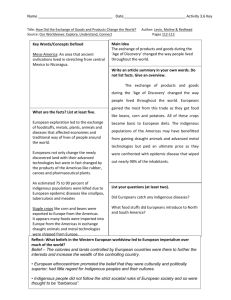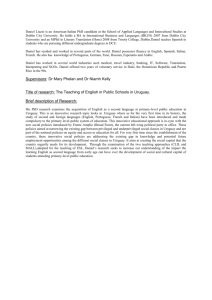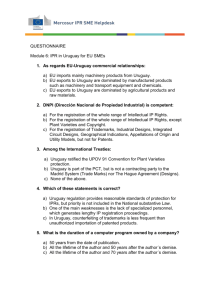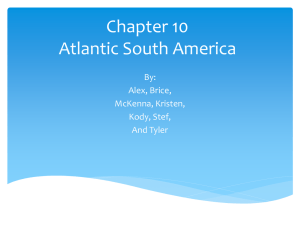OEA/Ser - Department of Conferences and Meetings Management
advertisement
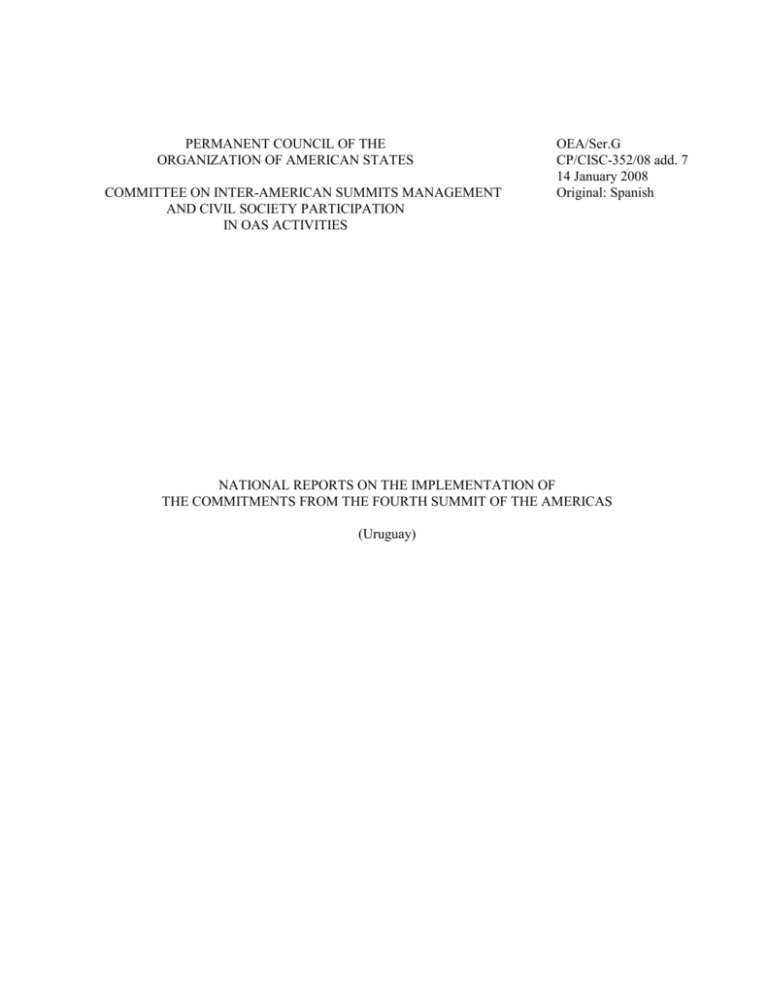
PERMANENT COUNCIL OF THE ORGANIZATION OF AMERICAN STATES COMMITTEE ON INTER-AMERICAN SUMMITS MANAGEMENT AND CIVIL SOCIETY PARTICIPATION IN OAS ACTIVITIES OEA/Ser.G CP/CISC-352/08 add. 7 14 January 2008 Original: Spanish NATIONAL REPORTS ON THE IMPLEMENTATION OF THE COMMITMENTS FROM THE FOURTH SUMMIT OF THE AMERICAS (Uruguay) Ministry of Foreign Affairs of the Eastern Republic of Uruguay General Directorate for Political Affairs NATIONAL IMPLEMENTATION REPORT This report refers to our country’s fulfillment of the mandates issued by the Fourth Summit of the Americas in its Plan of Action. 1. MANDATE I – CREATING DECENT WORK CHILD LABOR (items 2 and 3 of the Plan) As for the commitment to protecting children from economic exploitation and from work that could interfere with their education and integral development, we have established, by regulatory order, a Committee for the Eradication of Child Labor. It consists of the Ministry of the Interior, the National Institute for Children and Adolescents of Uruguay (INAU), and UNICEF, among other bodies. The Committee is charged with conducting programs to eliminate child labor in accordance with the mandates of the Summits of the Americas and the principles of the Millennium Declaration. EQUAL OPPORTUNITY IN THE WORKPLACE (item 4) As for gender equality in the workplace, our country has a Tripartite Commission for Equal Opportunity and Treatment in the Workplace, consisting of government agencies (Ministry of Labor and Social Security, Ministry of Social Development) and representatives of civil society (Pit-CNT and chambers of commerce). DECENT EMPLOYMENT OPPORTUNITIES FOR OLDER ADULTS (item 6) As for increasing employment opportunities for the older adult, draft legislation on the matter is now being considered in Parliament. INCLUSION OF LABOR FUNDAMENTALS IN STUDY PROGRAMS (items 3, 12, 13) As for promoting a values-based society, the Ministry of Labor and Social Security and the Ministry of Education and Culture, together with the National Public Instruction Administration, agreed on the need to strengthen the culture of work, and the concept of work as essential to the human being, by including in secondary education the basics of fundamental labor rights and the principles of decent work. To that effect, they signed a project agreement entitled “Building the future with decent work.” The project will be carried out in three phases, with ongoing advisory services throughout from the ILO, through Cinterfor/ILO. -2- MIGRATION (items 17, 18, and 20) The Declaration of Mar del Plata reaffirms the country’s position on matters that affect both national and transnational security. Uruguay supports the establishment of cooperation mechanisms and information-sharing and the incorporation into national law of legal instruments for reducing and/or preventing crimes, especially those related to migration, human trafficking, and terrorism. On migration matters, our country is fully engaged in pursuing the objectives of the Declaration. By Act 17,927, it has ratified the MERCOSUR Residence Agreement, a document drawn up bilaterally by Argentina and Brazil. Uruguay also reaffirms its commitment to these objectives, through the Preliminary Draft Migration Act, soon to be presented to the Legislature. That instrument deals with matters addressed at the Fourth Summit of the Americas, in that it enshrines a number of rights, such as the rights to migrate, to family reunification, to due process, and to access to justice. It also establishes equal rights between nationals and migrants, without discrimination. 2. MANDATE II – GROWTH WITH EMPLOYMENT SOCIAL DIALOGUE FOR POLICY DESIGN AND LABOR CONFLICT RESOLUTION (items 11 and 24) In this area we would point to the harmonious development of labor relations through collective bargaining, with the renewed convocation of the Wage Councils. Through these councils, businesspersons and labor unions have participated in determining working conditions and setting wages. In the public sector, the High-Level Council on Collective Bargaining has continued to operate. In a broader sense, we are implementing a National job generation strategy, the aim being growth based on decent employment, as provided in the Declaration of Mar del Plata. Three program areas have been defined for its implementation: public employment services, productive enterprises, and professional training. COORDINATION OF LABOR AND DEVELOPMENT POLICIES (item 27) Our country attaches priority to achieving concerted action among the secretariats of state responsible for economic, social, and labor policies. Various state structure reforms have been undertaken, all related to one another in that all are aimed at generating employment and reducing poverty. In this area we would point to the National Social Emergency Assistance Plan (PANES), tax reform, and health system reform. INFRASTRUCTURE INVESTMENTS (item 28) We would point to efforts in the context of the South American Community of Nations, through the South American Regional Infrastructure Integration Initiative (IIRSA). It is geared -3- toward securing investments in the basic infrastructure sector, on the understanding that they have positive effects on employment and economic growth. INCOME DISTRIBUTION (item 34) As for income distribution, the Government is promoting tax reform the primary aims of which are to foster more equitable distribution of the tax burden, make the tax system more efficient, and appropriately stimulate productive investment. In this sense the tax on personal income is based on the principle of equity. 3. MANDATE III – SOCIAL DEVELOPMENT SOCIAL POLICY IMPLEMENTATION AND DESIGN First we should note that economic, social, and cultural rights, including the right to development, are priorities for the Uruguayan Government, both in its domestic policies and lines of action and in its international affairs. At the multilateral level, Uruguay favors the adoption of an optional protocol to the International Covenant on Economic, Social and Cultural Rights to bring about the effective enjoyment of those rights. It is important also to emphasize Uruguay’s commitment to fulfilling the Millennium Development Goals, most of which are geared toward the individual and to providing his or her well-being and a decent quality of life. As for national commitments, our country understands that economic stability is essential to reducing poverty and improving the distribution of income, given that economic crises are the principal reason for which poverty and social exclusion have increased. On the understanding that permanent social policies are an essential part of all economic development strategies, a National Social Emergency Assistance Plan (PANES) has been designed. That Plan, through assistance and promotion, seeks to meet basic needs in the weakest and most vulnerable sectors of society, and to improve those populations’ capacity to participate in the economy and in society. According to data provided by the Ministry of Social Development, as of February 2007, 79,000 households are included in the Plan, or 330,000 personas (10% of the Uruguayan population); of these, 190,000 are under age 18. The PANES has various programs: ways out; productive work options; work for Uruguay; health care program; national nutrition plan: food card; assistance program for the homeless; socialeducational support program for critical zones; habitat improvement program; Uruguay Clasifica; social cooperative unit; campaign for the right to identity; time for solidarity. PRIMARY CARE MEASURES (item 50) In order to strengthen the Primary Health Care strategy, we created a department charged with applying national programs covering, inter alia, matters related to AIDS, women and gender, children and adolescents, older adults, disabilities, nutrition, and cancer control. -4- SOCIAL CHARTER OF THE AMERICAS (item 57) Our country, as Chair of the Joint Working Group, participates actively in negotiations on the Social Charter and its Plan of Action. We would also point to our participation in the Drafting Group meetings and our work at the ALADI Group level. The proposed Chapter I, presented by that group under the title “Eliminating poverty and achieving decent living standards to strengthen democracy with social justice,” is the basic text for the negotiations now being conducted by the rest of the member states. Our country is interested in continuing to work toward its conclusion at the end of 2007 (as mandated by the GA at its thirty-sixth regular session). 4. MANDATE IV – STRENGTHENING HEMISPHERIC GOVERNANCE DECLARATION ON THE DECADE OF THE AMERICAS FOR THE RIGHTS AND DIGNITY OF PERSONS WITH DISABILITIES (2006-2016) AND ITS PROGRAM OF ACTION (item 59) As for the protection and defense of the rights of persons with disabilities, the foreign ministry, in coordination with the Human Rights Directorate of the Ministry of Education and Culture, is following closely the process initiated in the UN and OAS contexts, so as to keep our country in line with international and regional commitments undertaken in this area. In March 2007, Uruguay signed the United Nations Convention on the Rights of Persons with Disabilities. It is conducting consultations at the national level on the optional protocol to that Convention. At the hemispheric level, Uruguay participated in the thirty-sixth regular session of the OAS General Assembly, held in 2006 in the Dominican Republic. Under the theme “Equality, Dignity, and Participation,” and the Assembly adopted the Declaration on the Decade of the Americas for the Rights and Dignity of Persons with Disabilities (2006-2016). Our country also participated in the first meeting of the Committee of the Inter-American Convention on the Elimination of All Forms of Discrimination against Persons with Disabilities, held on February 28 and March 1, 2007, in Panama City. The competent authorities are now working to deliver the initial report on progress and obstacles before May 31, 2007. AMERICAN DECLARATION ON THE RIGHTS OF INDIGENOUS PEOPLES (item 60) The various negotiating proposals now under consideration in the OAS framework to achieve substantive progress in the self-determination, individual rights, fundamental freedoms, and collective rights of indigenous peoples of the Hemisphere include the American Declaration on the Rights of Indigenous Peoples.Uruguay is a member of the INDIGENOUS Fund, having signed the -5- Agreement Establishing the Fund for the Development of the Indigenous Peoples of Latin America and the Caribbean, on July 24, 1992, and ratified it by Act N° 17.019 (published in the Official Gazette on November 11, 1998). Our country has a civil society delegation–made up of selfidentified indigenous groups–accredited to the Fund; the delegation is endorsed by the foreign ministry. Uruguay participated actively in the ninth meeting of negotiation in the quest for points of consensus held by the Working Group to Prepare the Draft American Declaration on the Rights of Indigenous Peoples. It supported Bolivia as host of the 10th meeting. Understanding that indigenous communities in the region historically have been highly vulnerable and marginalized, which has exposed them to human rights violations and continues to do so, Uruguay has given ample support to those texts that offer the greatest guarantees to indigenous communities. PROTOCOL OF SAN SALVADOR (item 63) The Additional Protocol to the American Convention on Human Rights in the area of Economic, Social, and Cultural Rights, or Protocol of San Salvador, which entered into force on November 16, 1999, was incorporated into Uruguayan law by Act 16,519 of July 12, 1994. On May 5, 2005, our country, together with other Latin American countries, sponsored proposed rules to govern the preparation of the periodic reports called for in Article 19 of the Protocol of San Salvador. Although our country is significantly behind schedule in submitting reports to the various United Nations and OAS agencies, the present government is committed to bringing its reporting up to date, with a view to reaffirming, developing, improving, and protecting in the Americas the fundamental economic, social, and cultural rights already recognized in previous human rights protection instruments, both international and regional. COOPERATION WITH HAITI (item 66) Uruguay participated in the meeting of the 2 x 9 Group held in Lima, Peru, on February 12, 2007–an important step toward the subsequent renewal of the MINUSTAH mandate for a period of eight months, by way of resolution 1743. With 1,125 troops deployed in Haiti, our country is providing the second-largest contingent to that stabilization force. Representatives of our country’s Armed Forces also participated, as instructors, in the course held in February 2007 at the Regional Peacekeeping Operations Command (CREOMPAZ), Guatemala, an initiative promoted by the United States. The topic of cooperation with Haiti is on the agenda of the Rio Group–evidence of its political importance and of the commitment undertaken in this regard at the regional level. -6- APPLICATION OF THE INTER-AMERICAN CONVENTION AGAINST CORRUPTION (item 64) Uruguay participated in the 10th meeting of the Committee of Experts of the MESISIC, held in December 2006. In addition, on November 14, 2006, our Parliament approved the United Nations Convention against Corruption, of December 11, 2003. CP19398E04
